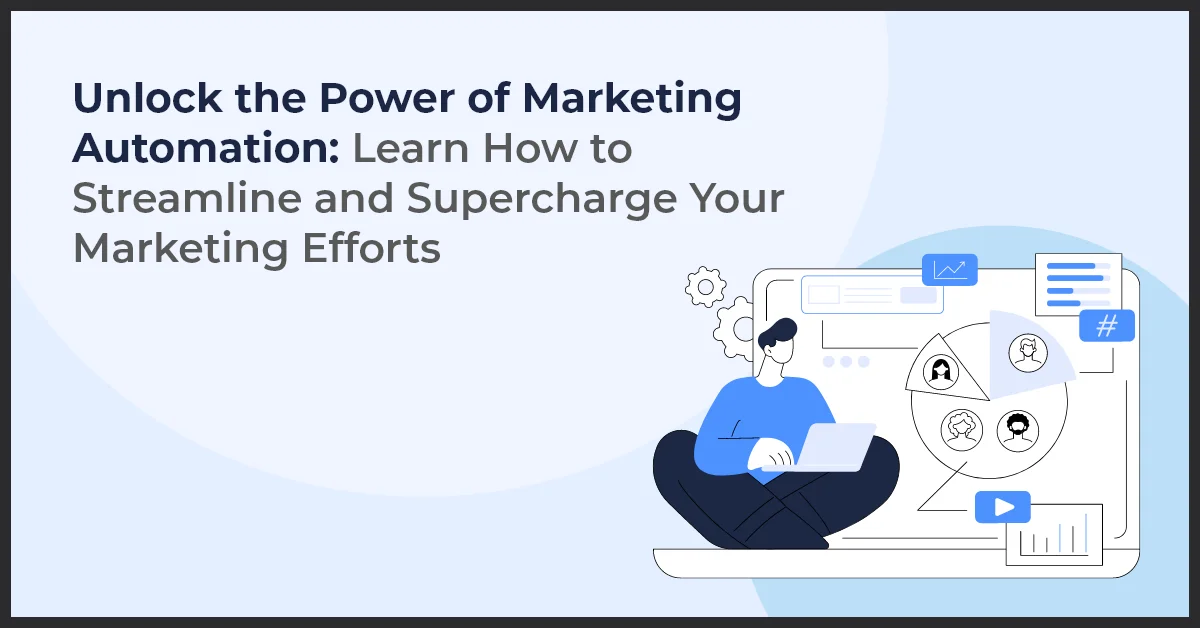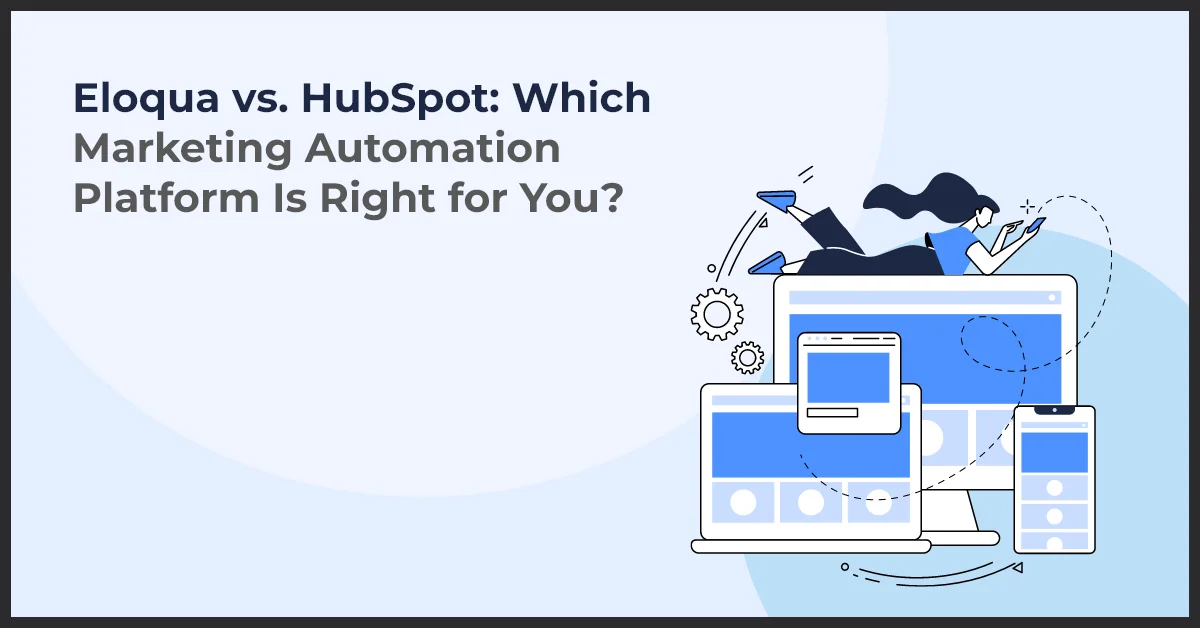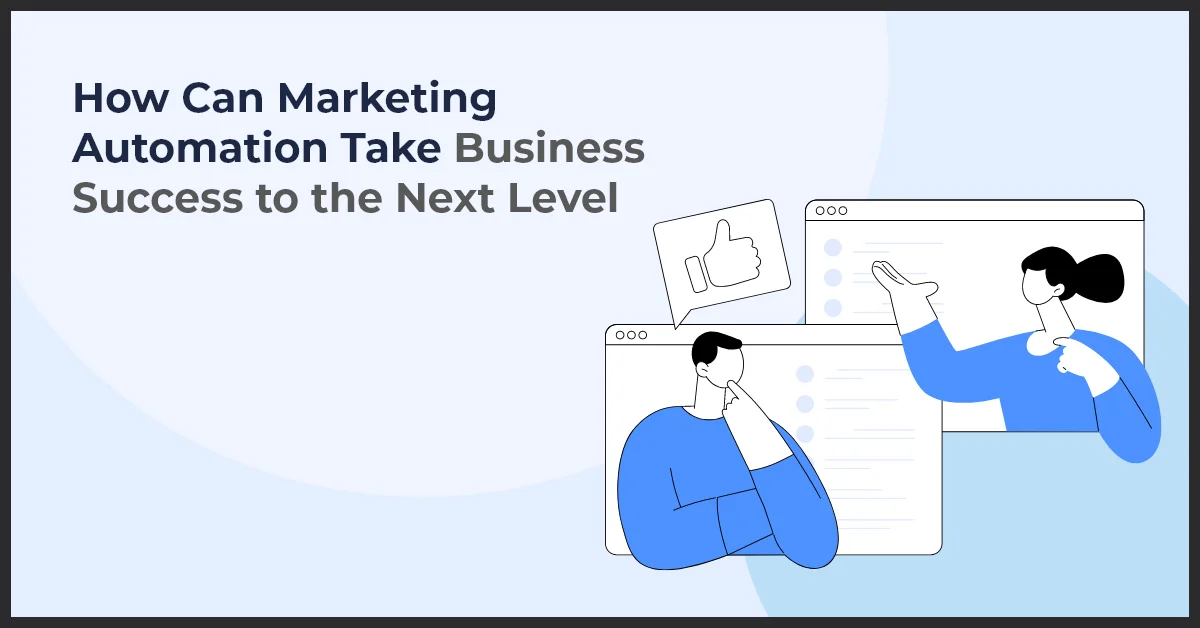Unlock the Power of Marketing Automation: Learn How to Streamline and Supercharge Your Marketing Efforts

Published on: October 30, 2023
Updated on: July 02, 2024
1771 Views
- Marketing Automation
18 min read
Are you looking to take your business to new heights? Look no further than marketing automation. In today's fast-paced digital landscape, it's essential for businesses to stay ahead of the curve by leveraging cutting-edge technologies. That's where marketing automation steps in to revolutionize the way you engage with your audience and drive growth.
Marketing automation refers to the use of software and tools to automate repetitive marketing tasks, streamline workflows, and effectively manage your customer journey. By adopting this game-changing approach, businesses can not only save time and resources but also create more personalized and targeted experiences for their customers.
So, why should businesses invest in marketing automation? The benefits are plentiful. Firstly, it allows you to nurture leads and build stronger relationships with your customers through automated email drips, personalized messaging, and behavior-based triggers. By delivering the right message at the right time, you can significantly improve conversion rates and customer satisfaction.
Moreover, marketing automation empowers sales and marketing teams to collaborate seamlessly. By integrating your CRM system with marketing automation tools, you'll gain valuable insights into your prospects' behaviors, preferences, and engagement levels. This data-driven approach enables you to tailor your marketing campaigns, identify qualified leads, and prioritize sales efforts.
Additionally, marketing automation simplifies lead management and tracking. Gone are the days of manual data entry and spreadsheets. With automation, you can effortlessly capture and segment leads, assign them to the appropriate teams, and track their progress throughout the sales funnel. This not only ensures a smoother lead generation process but also facilitates accurate reporting and analysis.
Ready to embark on your marketing automation journey? Stay tuned as we delve into the nitty-gritty of this powerful tool, share actionable tips, and explore real-life case studies of businesses that have achieved remarkable results through marketing automation.
Marketing Automation Basics
In today's digital age, marketing automation has become an essential tool for businesses of all sizes. By streamlining and automating repetitive marketing tasks, businesses can save time and resources while boosting their overall marketing efforts. In this section, we will explore the foundations of marketing automation, understand the key features and functionalities of marketing automation systems, and take a look at some popular marketing automation platforms.
Understanding the foundations of marketing automation
Marketing automation is a technology that allows businesses to automate their marketing tasks and workflows. It combines software and strategies to effectively manage and nurture leads, automate repetitive tasks, and deliver personalized messages to potential customers at various stages of the buyer's journey.
Defining marketing automation tools and software (Topic 1)
Marketing automation tools and software are the backbone of any successful marketing automation strategy. These tools enable businesses to automate various aspects of their marketing campaigns, such as email marketing, lead generation, social media management, and more. They provide features like email automation, lead scoring, customer segmentation, and analytics to optimize marketing efforts.
Exploring popular marketing automation platforms
There are numerous marketing automation platforms available in the market, each offering its unique set of features and functionalities. Some popular marketing automation platforms include HubSpot, Marketo, Pardot, and Mailchimp. These platforms provide businesses with an all-in-one solution for managing their marketing campaigns and automating their marketing processes.
Key features and functionalities of marketing automation systems
Marketing automation systems offer a range of features and functionalities to help businesses streamline their marketing efforts. Some key features include email automation, lead nurturing, lead scoring, CRM integration, social media automation, personalized content creation, and analytics and reporting. These features work together to automate repetitive tasks, nurture leads, and provide valuable insights for optimizing marketing campaigns.
Email Marketing Automation Strategies
Implementing email marketing automation can greatly enhance your marketing efforts and improve your overall campaign performance. By automating your email marketing, you can save time, increase efficiency, and deliver more targeted and personalized messages to your audience. Here are some effective strategies to help you make the most out of email marketing automation:
How to effectively utilize email marketing automation (Topic 2)
When it comes to email marketing automation, it's important to have a clear understanding of your goals and objectives. Define your target audience, segment your email lists, and craft targeted messages that align with your audience's interests and needs. Use automation tools to schedule and send these emails at the right time, ensuring maximum engagement and conversions.
Designing engaging and personalized email campaigns
A key aspect of successful email marketing automation is creating engaging and personalized email campaigns. Use dynamic content to tailor your emails based on subscribers' preferences, behavior, and demographics. Personalization is key to capturing your audience's attention and driving them towards action.
Building automated workflows for email marketing
Automated workflows can streamline your email marketing efforts and ensure consistent messaging. Map out your customer journey and create triggered emails that are sent based on specific actions or behaviors. This could include welcome emails, abandoned cart reminders, or anniversary offers. By automating these workflows, you can nurture leads and guide them through the buyer's journey.
Tips for effective email deliverability and engagement rates
To ensure your emails reach your subscribers' inboxes and drive engagement, it's important to follow best practices for email deliverability. This includes regularly cleaning your email list, using double opt-ins, avoiding spam trigger words, and testing your emails across different platforms and devices. Additionally, monitor your engagement rates and make necessary adjustments to optimize your email marketing performance.
By implementing these email marketing automation strategies, you can enhance your campaigns and achieve better results. Stay tuned for the next section where we'll explore lead generation and nurturing automation techniques.
Lead Generation and Nurturing Automation Techniques
In order to maximize the effectiveness of marketing automation, it is crucial to have a strong lead generation and nurturing strategy in place. By automating these processes, businesses can save time and resources while ensuring that leads are properly nurtured and guided through the sales funnel.
Best practices for automating lead generation
When it comes to lead generation, automation can significantly streamline the process. Here are some best practices to consider:
- Use lead capture forms: Implementing lead capture forms on your website and landing pages can help you collect valuable contact information from potential leads.
- Optimize landing pages: Create targeted and compelling landing pages that are designed to capture leads. Testing different elements such as headlines, images, and call-to-action buttons can help improve conversion rates.
- Utilize gated content: Offer valuable content such as ebooks or whitepapers in exchange for contact information. Gated content can help generate leads and build a database of potential customers.
Implementing lead nurturing strategies using marketing automation
Once leads are captured, it is essential to nurture them through the buyer's journey. Marketing automation can help deliver targeted content and personalized messages, ensuring that leads stay engaged and continue to move closer to making a purchase:
- Segmentation: Divide your leads into different segments based on demographics, behavior, or interests. By segmenting your leads, you can create targeted campaigns that resonate with each group.
- Lead scoring: Assign scores to your leads based on their engagement and interaction with your content. This allows you to prioritize and focus on the leads that are most likely to convert, increasing efficiency and effectiveness.
- Automated drip campaigns: Set up automated email campaigns that deliver a series of relevant and timely messages to your leads. Drip campaigns help nurture leads by providing them with valuable content at the right time.
Leveraging lead scoring and segmentation for targeted campaigns
By combining lead scoring and segmentation, businesses can create highly targeted campaigns that are tailored to the specific needs and interests of their leads:
- Personalization: Use marketing automation to dynamically personalize your content based on the preferences and behavior of each lead. Personalization can help increase engagement and conversion rates.
- Triggered campaigns: Set up triggered campaigns that are automatically sent based on specific actions or behaviors of your leads. For example, if a lead downloads a certain ebook, you can trigger a follow-up email with related content.
- Dynamic content: Deliver content that is personalized and relevant to each lead's stage in the buyer's journey. By presenting the right content at the right time, you can guide leads towards making a purchase.
Implementing effective lead generation and nurturing automation techniques is crucial for maximizing the benefits of marketing automation. By following these best practices and leveraging the capabilities of marketing automation platforms, businesses can generate more leads, nurture them effectively, and ultimately increase conversions and revenue.
Social Media Automation and Scheduling
When it comes to managing social media campaigns, automation tools can be a game-changer. These tools allow you to streamline your social media efforts and save time while ensuring consistency in your messaging.
One key aspect of social media automation is exploring social media management platforms that offer automation features. These platforms provide a centralized hub where you can schedule and manage your social media posts across multiple channels.
Another essential element of social media automation is creating content calendars and automated scheduling. By planning your social media content in advance and scheduling it to be published at specific times, you can maintain a consistent presence on social media without having to constantly log in and manually publish posts.
By leveraging social media automation tools and features, you can optimize your social media campaigns, increase efficiency, and reach your target audience more effectively.
Integrating Marketing Automation with CRM Systems
In order to fully leverage the power of marketing automation, it is crucial to integrate it with Customer Relationship Management (CRM) systems. This integration allows businesses to streamline their marketing efforts and optimize their customer relationships.
The importance of integrating marketing automation with CRM
By integrating marketing automation with CRM, businesses can achieve a deeper understanding of their customers and their behavior. This integration enables businesses to:
- Enhance lead management: With marketing automation coupled with CRM systems, businesses can effectively manage and nurture leads through the entire customer journey, from acquisition to conversion.
- Improve customer communication: By syncing marketing automation and CRM systems, businesses can deliver targeted and personalized communications to their customers based on their preferences, behaviors, and demographics.
- Gain valuable insights: The integration of marketing automation and CRM systems allows businesses to gather valuable insights about their customers, such as their purchasing patterns, preferences, and engagement history. These insights can then be used to optimize marketing strategies and drive better results.
Efficient use of CRM data in marketing automation workflows
Integrating marketing automation with CRM systems enables businesses to efficiently utilize CRM data in their automation workflows. This means that businesses can:
- Automatically segment contacts: By leveraging CRM data, businesses can segment their contacts based on various criteria such as industry, past purchases, or engagement level. This allows for more targeted and personalized marketing campaigns.
- Trigger automation based on CRM events: With the integration of marketing automation and CRM, businesses can set up automation workflows that are triggered by specific CRM events, such as a lead reaching a certain score or a customer making a purchase. This ensures timely and relevant communication with customers.
- Customize content based on CRM data: By using CRM data, businesses can dynamically personalize the content of their marketing messages. This personalization can be based on factors such as a customer's past purchases, preferences, or demographics.
Syncing and managing customer data between platforms
Integrating marketing automation with CRM systems also enables businesses to sync and manage customer data seamlessly between the two platforms. This allows businesses to:
- Keep customer records up to date: When marketing automation and CRM systems are integrated, any updates made to customer records in one platform will automatically be reflected in the other. This ensures that businesses have the most accurate and up-to-date customer information.
- Prevent data duplication: By syncing customer data between marketing automation and CRM systems, businesses can avoid duplicating customer records and maintain a clean and organized database.
- Track and analyze customer interactions: The integration of marketing automation and CRM systems allows businesses to track and analyze customer interactions across different touchpoints. This comprehensive view of customer behavior enables businesses to make data-driven decisions and optimize their marketing strategies.
Marketing Automation Analytics and Reporting
Effective marketing automation goes beyond just automating repetitive tasks. It also provides valuable insights and data that help businesses measure success, track key metrics, and make informed decisions. In this section, we'll explore the importance of marketing automation analytics and reporting, and discover the tools and techniques used to achieve accurate reporting.
Measuring Success with Marketing Automation
One of the main benefits of marketing automation is the ability to measure the success of your campaigns and strategies. By tracking and analyzing specific metrics and key performance indicators (KPIs), you can gain valuable insights into the effectiveness of your marketing efforts. With marketing automation, you can easily track metrics such as open rates, click-through rates, conversion rates, and more, providing you with a clear picture of how well your marketing campaigns are performing.
Tracking and Analyzing Key Metrics and KPIs
In order to improve your marketing efforts, it's crucial to track and analyze key metrics and KPIs. Marketing automation platforms offer robust reporting capabilities that allow you to monitor the performance of your campaigns in real-time. By analyzing metrics such as engagement rates, lead generation, customer acquisition costs, and customer lifetime value, you can make data-driven decisions to optimize your marketing strategies and drive better results.
Reporting Automation Tools and Techniques
To simplify the reporting process and effectively analyze your marketing automation data, specialized reporting automation tools and techniques are available. These tools provide customizable dashboards, advanced data visualization, and automated report generation, saving you time and effort. By utilizing these tools, you can create comprehensive reports that highlight the most important metrics and present the data in a visually appealing and easy-to-understand format.
With marketing automation analytics and reporting, you can gain deep insights into your campaigns' performance, understand your target audience better, and improve your overall marketing strategy. By tracking and analyzing key metrics and utilizing reporting automation tools, you can make data-driven decisions that lead to better marketing outcomes.
Best Practices for Implementing Marketing Automation
Implementing marketing automation can greatly improve your marketing efforts and drive better results. However, to ensure a successful implementation, it is important to follow best practices and consider key factors. Here are some tips to help you get started:
Tips for successful marketing automation implementation
- Define clear goals and objectives for your marketing automation efforts.
- Start small and scale gradually. Consider implementing automation in stages rather than trying to automate everything at once.
- Ensure your marketing and sales teams are aligned and have a clear understanding of how automation will be used.
- Invest in quality data. Clean and accurate data is crucial for effective automation.
- Regularly review and update your automation workflows to keep them relevant and effective.
- Test and optimize. Continuously monitor your automation campaigns and make data-driven adjustments to improve performance.
Key considerations when selecting a marketing automation platform
- Understand your specific business needs and goals and choose a platform that aligns with them.
- Consider ease of use and user experience. A user-friendly platform will help streamline implementation and adoption.
- Look for a platform that integrates seamlessly with your existing systems, such as your CRM.
- Check for the availability of training and support resources to ensure a smooth onboarding process.
- Evaluate the scalability and flexibility of the platform to accommodate future growth and changing needs.
Strategies for onboarding and training teams
- Provide comprehensive training on the chosen marketing automation platform to ensure all team members are proficient in using it.
- Assign a dedicated team lead or project manager to oversee the implementation process and provide guidance and support to other team members.
- Document and share best practices and internal processes with the team to foster consistency and efficiency.
- Encourage ongoing learning and continuous improvement by offering regular training sessions and access to knowledge resources.
- Establish clear communication channels and encourage open dialogue within the team to address any challenges or questions that may arise.
Drip Campaigns and Automated Workflows
Drip campaigns and automated workflows are essential components of marketing automation. These strategies help businesses stay connected with their customers and nurture leads throughout the customer journey. In this section, we will explore how to effectively design drip campaigns, set up automated workflows, and optimize them for better conversion and engagement.
How to effectively design drip campaigns
Drip campaigns are a series of automated emails or messages that are sent to prospects or customers at predefined intervals. They aim to keep your audience engaged, informed, and move them closer to making a purchase or achieving a desired action.
The key to designing effective drip campaigns lies in personalization and segmentation. By understanding your audience and their preferences, you can create tailored content that resonates with them. Use strong tags to emphasize key points and benefits of your products or services.
Setting up automated workflows for different customer journeys
Automated workflows enable you to streamline and automate your marketing processes based on customer behavior and actions. By setting up triggers and actions, you can ensure that the right messages are delivered to the right people at the right time.
For example, you can create a workflow that triggers when a prospect signs up for your newsletter. This automated workflow can then send a series of welcome emails, provide relevant content, and eventually guide the prospect towards making a purchase.
Optimizing drip campaigns for conversion and engagement
To optimize your drip campaigns for better conversion and engagement, it's important to constantly analyze and iterate. Use marketing automation analytics and reporting tools to track the performance of your campaigns and identify areas for improvement.
Some key optimization techniques include testing different subject lines, call-to-action buttons, and email content. Additionally, segmenting your audience based on their behavior and preferences allows you to deliver more targeted and relevant messages.
Remember to use strong tags to highlight the benefits and value proposition of your offerings throughout your drip campaigns.
Marketing Automation Learning Courses
Are you ready to dive deep into the world of marketing automation? Whether you're a beginner or an experienced marketer, there are plenty of online courses and platforms available to help you master this powerful tool. Here, we've compiled some recommended resources that will take your marketing automation skills to the next level.
Recommended Online Courses
- Marketing Automation Mastery: This comprehensive course covers all aspects of marketing automation, from setting up campaigns and workflows to analyzing data and optimizing performance. Learn from industry experts and gain hands-on experience through practical exercises.
- Advanced Marketing Automation Strategies: Take your marketing automation knowledge further with this advanced course. Explore advanced techniques for segmentation, personalization, and integration with CRM systems. Get ready to supercharge your marketing automation campaigns!
- Marketing Automation Certification Program: Looking to enhance your credentials? This certification program offers a deep dive into marketing automation concepts and best practices. Earn a recognized certification to demonstrate your expertise in the field.
Key Educational Resources
Aside from courses, there are various educational resources that can help you expand your marketing automation knowledge:
- Industry Blogs and Websites: Stay up to date with the latest trends, tips, and best practices by following industry-leading blogs and websites dedicated to marketing automation. These resources often provide valuable insights and real-life case studies.
- Online Communities and Forums: Engage with other marketers and automation experts in online communities and forums. Share your experiences, ask questions, and learn from the collective wisdom of the community.
- Webinars and Workshops: Attend webinars and workshops hosted by marketing automation professionals. These interactive sessions offer a great opportunity to learn from industry leaders, ask questions, and gain practical knowledge.
Now that you have a better understanding of the learning courses and platforms available, you're well-equipped to embark on your marketing automation journey. Get ready to elevate your marketing strategies and drive better results with the power of automation!
Conclusion: The Future of Marketing Automation
As technology continues to advance at a rapid pace, so does the world of marketing automation. With the ever-increasing demand for personalized and targeted marketing campaigns, marketing automation has proven to be an invaluable tool for businesses of all sizes.
Emerging trends and advancements in marketing automation show no signs of slowing down. Artificial intelligence (AI) and machine learning are becoming integral parts of marketing automation platforms, allowing for even more sophisticated and accurate targeting.
Integrating marketing automation with other technologies, such as CRM systems, will further streamline marketing processes and create a seamless customer experience. Automation will continue to play a crucial role in lead generation, nurturing, and conversion, enabling marketers to focus their efforts on high-value tasks.
Staying ahead in the automation-driven landscape requires constant adaptation and learning. Marketers must keep up with industry trends, learn new technologies, and refine their strategies to remain competitive. As marketing automation continues to evolve, those who embrace continuous learning will have a greater advantage in optimizing their marketing efforts.
In conclusion, marketing automation is no longer a luxury but a necessity for businesses looking to thrive in the digital age. It empowers marketers to reach the right audience, at the right time, with the right message. By implementing the right marketing automation platform and embracing continuous learning, businesses can maximize their marketing efforts and stay ahead of the curve.



